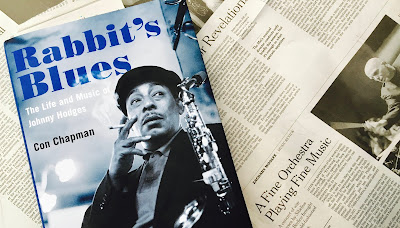“The birth of one style in an art form generally means the death of another,” Con Chapman declares in his illuminating new biography Rabbit’s Blues: The Life and Music of Johnny Hodges. The author is referring to Charlie Parker’s displacement of Hodges as jazz’s preeminent saxophonist. Parker is revered in his hometown of Kansas City and throughout the world. Yet his innovations were almost as disruptive to the musical landscape as the Beatles’ appearance on The Ed Sullivan Show.
Chapman laments “the depths of obscurity to which the man who was once one of the most famous saxophonists in the world had fallen.” His biography is a noble attempt to restore Hodges’ place of importance. Rabbit’s Blues makes a strong case for Hodges as an essential link between Sidney Bechet and John Coltrane and is a convincing defence of the sensuous swing that Parker rendered unfashionable.
The unapologetically romantic Hodges was rarely cloying. When considering Hodges’ unlikely album with the “white square” Lawrence Welk, Chapman suggests “one need only compare a latter-day sentimentalist on the soprano sax such as Kenny G to Hodges to detect the difference between emotion used in the service of melody and emotional technique used as superficial decoration, like gingerbread trim on a Victorian house.”
In addition to faithfully documenting the decades Hodges spent as one of the most celebrated members of the orchestras led by Duke Ellington, Chapman paints a vivid portrait of a complicated man who successfully overcame the racial discrimination, music industry misdeeds and substance abuse pandemic associated with his times.
Chapman documents Hodges’ recording sessions in fastidious detail. Much of Hodges’ most essential work was released under the banner of the Ellington band or with collaborators like Wild Bill Davis. Tracking down his individual tracks and complete albums on streaming services or music retailers isn’t always easy. The failure to include a discography in Rabbit’s Blues, consequently, is frustrating. Yet Chapman’s persuasive case for Hodges’ art is entirely successful. Bingeing on Rabbit’s timeless recordings caused this appreciative reader to begin to lament Bird’s bop revolution.
(Original image by Plastic Sax.)
Subscribe to:
Post Comments (Atom)

No comments:
Post a Comment